HLSC220: Debate on Healthcare Ethics and Aged Care Services
VerifiedAdded on 2022/12/19
|7
|1841
|161
Discussion Board Post
AI Summary
This assignment presents a debate on healthcare ethics in nursing, focusing on the principle of justice and the need to increase spending on aged care services. The student argues that vulnerable older people with multiple health problems require extensive care and medication, emphasizing the importance of dignity, trust, and a supportive environment. The debate highlights the ethical considerations of providing the best possible treatment, even if it means altering equality to bring justice. The student uses references to support the arguments. The rebuttal acknowledges the need for additional care for older patients, and highlights the importance of maintaining the quality of care and the importance of environment and human resource management. The debate concludes by emphasizing the importance of funding for aged care services.
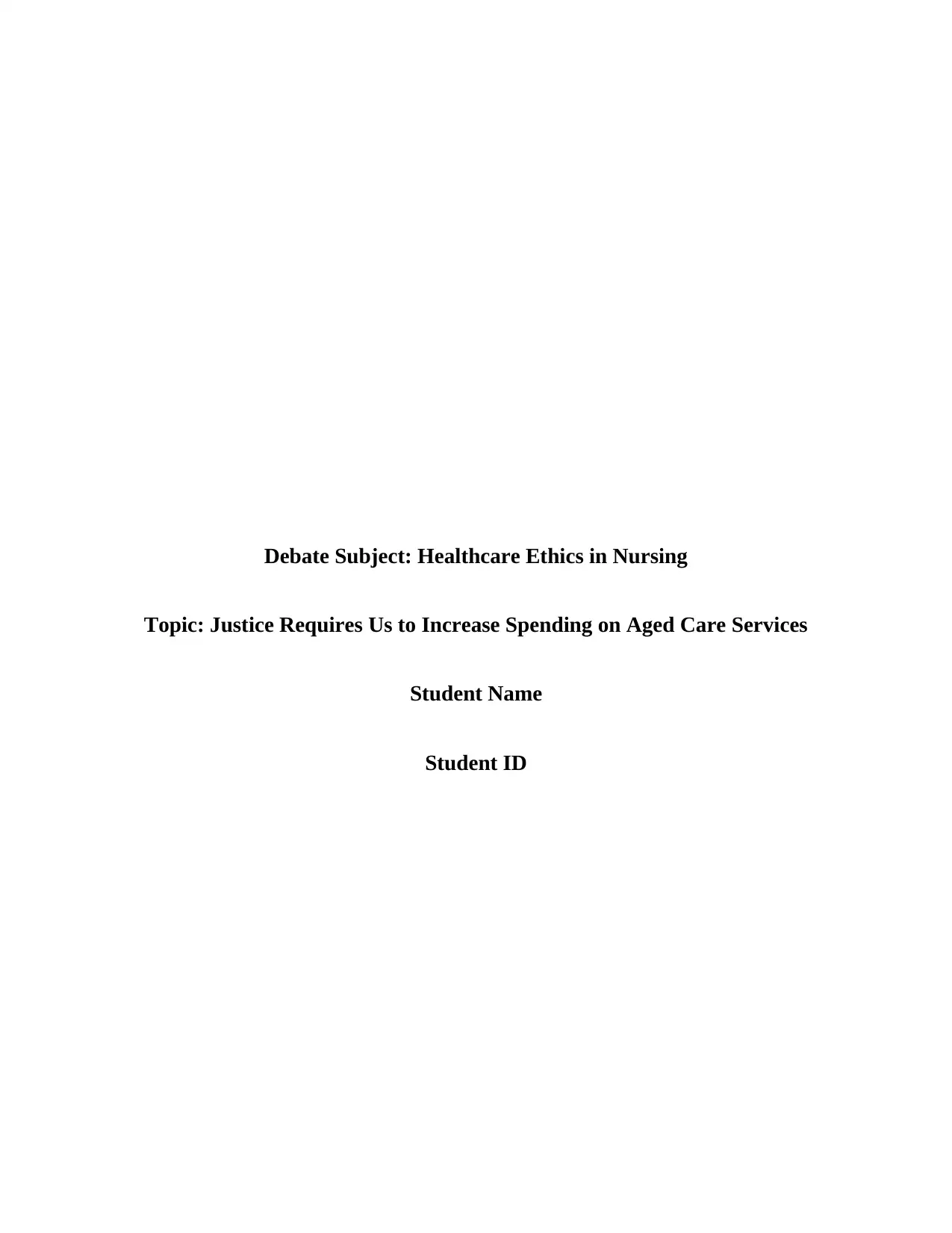
Debate Subject: Healthcare Ethics in Nursing
Topic: Justice Requires Us to Increase Spending on Aged Care Services
Student Name
Student ID
Topic: Justice Requires Us to Increase Spending on Aged Care Services
Student Name
Student ID
Paraphrase This Document
Need a fresh take? Get an instant paraphrase of this document with our AI Paraphraser
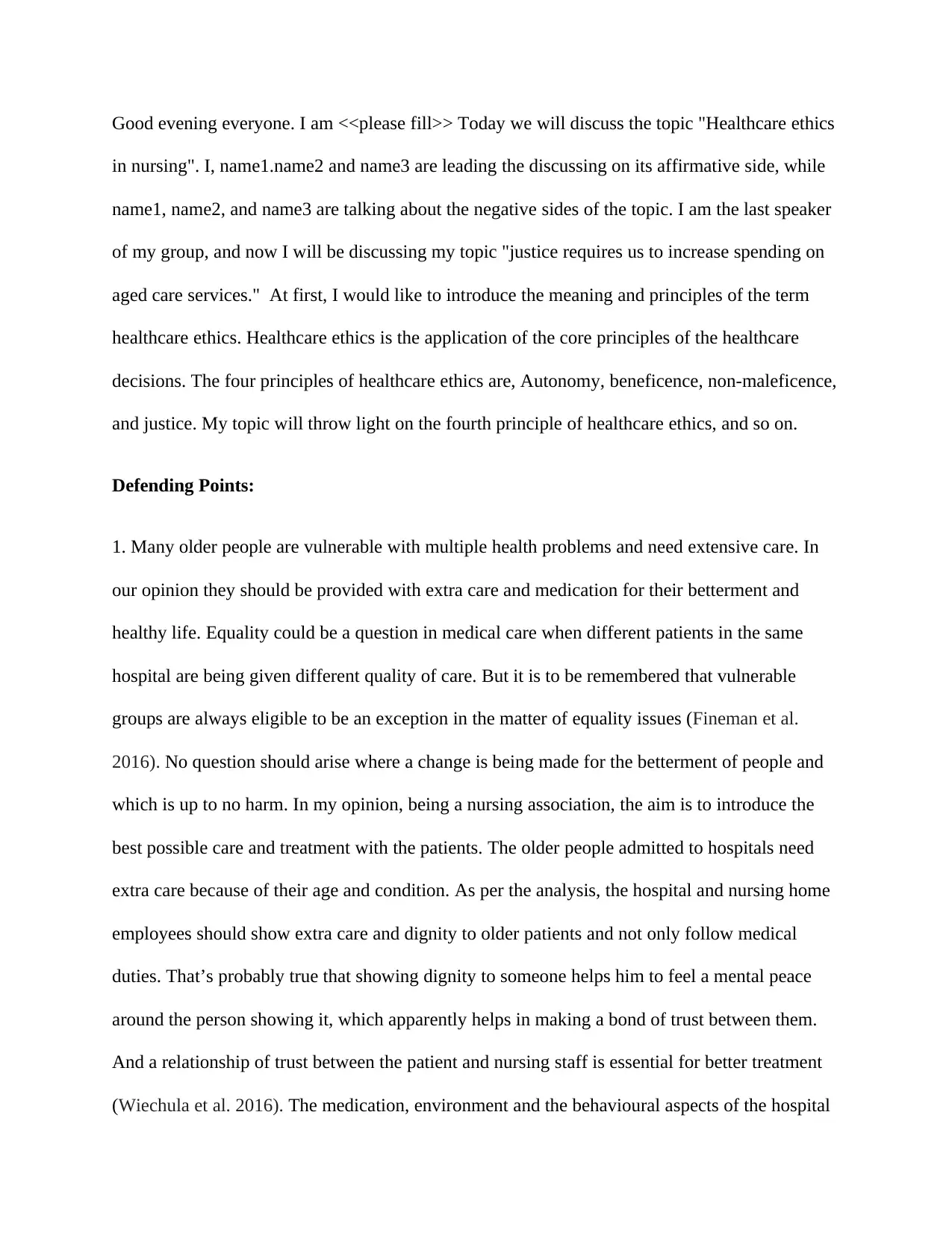
Good evening everyone. I am <<please fill>> Today we will discuss the topic "Healthcare ethics
in nursing". I, name1.name2 and name3 are leading the discussing on its affirmative side, while
name1, name2, and name3 are talking about the negative sides of the topic. I am the last speaker
of my group, and now I will be discussing my topic "justice requires us to increase spending on
aged care services." At first, I would like to introduce the meaning and principles of the term
healthcare ethics. Healthcare ethics is the application of the core principles of the healthcare
decisions. The four principles of healthcare ethics are, Autonomy, beneficence, non-maleficence,
and justice. My topic will throw light on the fourth principle of healthcare ethics, and so on.
Defending Points:
1. Many older people are vulnerable with multiple health problems and need extensive care. In
our opinion they should be provided with extra care and medication for their betterment and
healthy life. Equality could be a question in medical care when different patients in the same
hospital are being given different quality of care. But it is to be remembered that vulnerable
groups are always eligible to be an exception in the matter of equality issues (Fineman et al.
2016). No question should arise where a change is being made for the betterment of people and
which is up to no harm. In my opinion, being a nursing association, the aim is to introduce the
best possible care and treatment with the patients. The older people admitted to hospitals need
extra care because of their age and condition. As per the analysis, the hospital and nursing home
employees should show extra care and dignity to older patients and not only follow medical
duties. That’s probably true that showing dignity to someone helps him to feel a mental peace
around the person showing it, which apparently helps in making a bond of trust between them.
And a relationship of trust between the patient and nursing staff is essential for better treatment
(Wiechula et al. 2016). The medication, environment and the behavioural aspects of the hospital
in nursing". I, name1.name2 and name3 are leading the discussing on its affirmative side, while
name1, name2, and name3 are talking about the negative sides of the topic. I am the last speaker
of my group, and now I will be discussing my topic "justice requires us to increase spending on
aged care services." At first, I would like to introduce the meaning and principles of the term
healthcare ethics. Healthcare ethics is the application of the core principles of the healthcare
decisions. The four principles of healthcare ethics are, Autonomy, beneficence, non-maleficence,
and justice. My topic will throw light on the fourth principle of healthcare ethics, and so on.
Defending Points:
1. Many older people are vulnerable with multiple health problems and need extensive care. In
our opinion they should be provided with extra care and medication for their betterment and
healthy life. Equality could be a question in medical care when different patients in the same
hospital are being given different quality of care. But it is to be remembered that vulnerable
groups are always eligible to be an exception in the matter of equality issues (Fineman et al.
2016). No question should arise where a change is being made for the betterment of people and
which is up to no harm. In my opinion, being a nursing association, the aim is to introduce the
best possible care and treatment with the patients. The older people admitted to hospitals need
extra care because of their age and condition. As per the analysis, the hospital and nursing home
employees should show extra care and dignity to older patients and not only follow medical
duties. That’s probably true that showing dignity to someone helps him to feel a mental peace
around the person showing it, which apparently helps in making a bond of trust between them.
And a relationship of trust between the patient and nursing staff is essential for better treatment
(Wiechula et al. 2016). The medication, environment and the behavioural aspects of the hospital
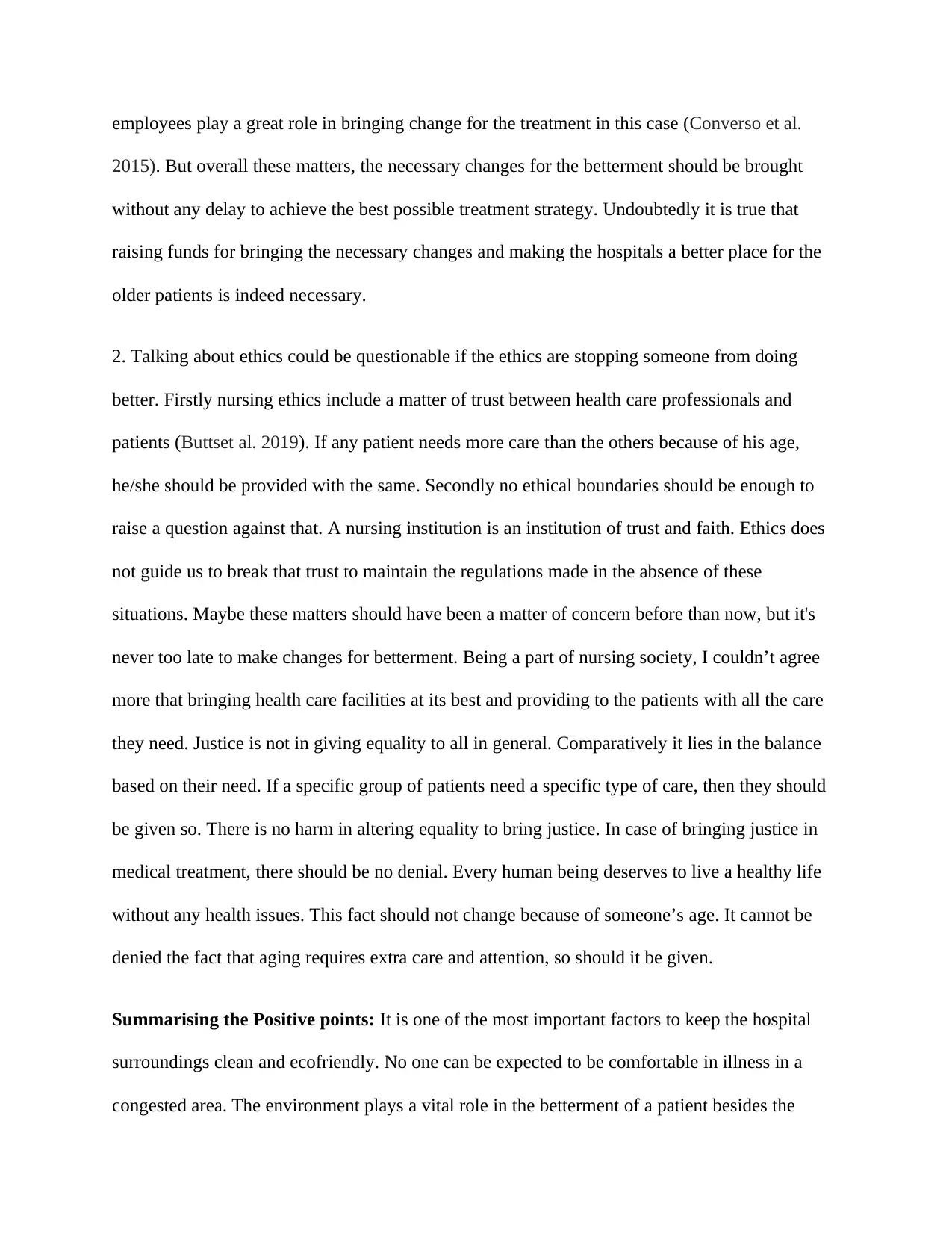
employees play a great role in bringing change for the treatment in this case (Converso et al.
2015). But overall these matters, the necessary changes for the betterment should be brought
without any delay to achieve the best possible treatment strategy. Undoubtedly it is true that
raising funds for bringing the necessary changes and making the hospitals a better place for the
older patients is indeed necessary.
2. Talking about ethics could be questionable if the ethics are stopping someone from doing
better. Firstly nursing ethics include a matter of trust between health care professionals and
patients (Buttset al. 2019). If any patient needs more care than the others because of his age,
he/she should be provided with the same. Secondly no ethical boundaries should be enough to
raise a question against that. A nursing institution is an institution of trust and faith. Ethics does
not guide us to break that trust to maintain the regulations made in the absence of these
situations. Maybe these matters should have been a matter of concern before than now, but it's
never too late to make changes for betterment. Being a part of nursing society, I couldn’t agree
more that bringing health care facilities at its best and providing to the patients with all the care
they need. Justice is not in giving equality to all in general. Comparatively it lies in the balance
based on their need. If a specific group of patients need a specific type of care, then they should
be given so. There is no harm in altering equality to bring justice. In case of bringing justice in
medical treatment, there should be no denial. Every human being deserves to live a healthy life
without any health issues. This fact should not change because of someone’s age. It cannot be
denied the fact that aging requires extra care and attention, so should it be given.
Summarising the Positive points: It is one of the most important factors to keep the hospital
surroundings clean and ecofriendly. No one can be expected to be comfortable in illness in a
congested area. The environment plays a vital role in the betterment of a patient besides the
2015). But overall these matters, the necessary changes for the betterment should be brought
without any delay to achieve the best possible treatment strategy. Undoubtedly it is true that
raising funds for bringing the necessary changes and making the hospitals a better place for the
older patients is indeed necessary.
2. Talking about ethics could be questionable if the ethics are stopping someone from doing
better. Firstly nursing ethics include a matter of trust between health care professionals and
patients (Buttset al. 2019). If any patient needs more care than the others because of his age,
he/she should be provided with the same. Secondly no ethical boundaries should be enough to
raise a question against that. A nursing institution is an institution of trust and faith. Ethics does
not guide us to break that trust to maintain the regulations made in the absence of these
situations. Maybe these matters should have been a matter of concern before than now, but it's
never too late to make changes for betterment. Being a part of nursing society, I couldn’t agree
more that bringing health care facilities at its best and providing to the patients with all the care
they need. Justice is not in giving equality to all in general. Comparatively it lies in the balance
based on their need. If a specific group of patients need a specific type of care, then they should
be given so. There is no harm in altering equality to bring justice. In case of bringing justice in
medical treatment, there should be no denial. Every human being deserves to live a healthy life
without any health issues. This fact should not change because of someone’s age. It cannot be
denied the fact that aging requires extra care and attention, so should it be given.
Summarising the Positive points: It is one of the most important factors to keep the hospital
surroundings clean and ecofriendly. No one can be expected to be comfortable in illness in a
congested area. The environment plays a vital role in the betterment of a patient besides the
⊘ This is a preview!⊘
Do you want full access?
Subscribe today to unlock all pages.

Trusted by 1+ million students worldwide
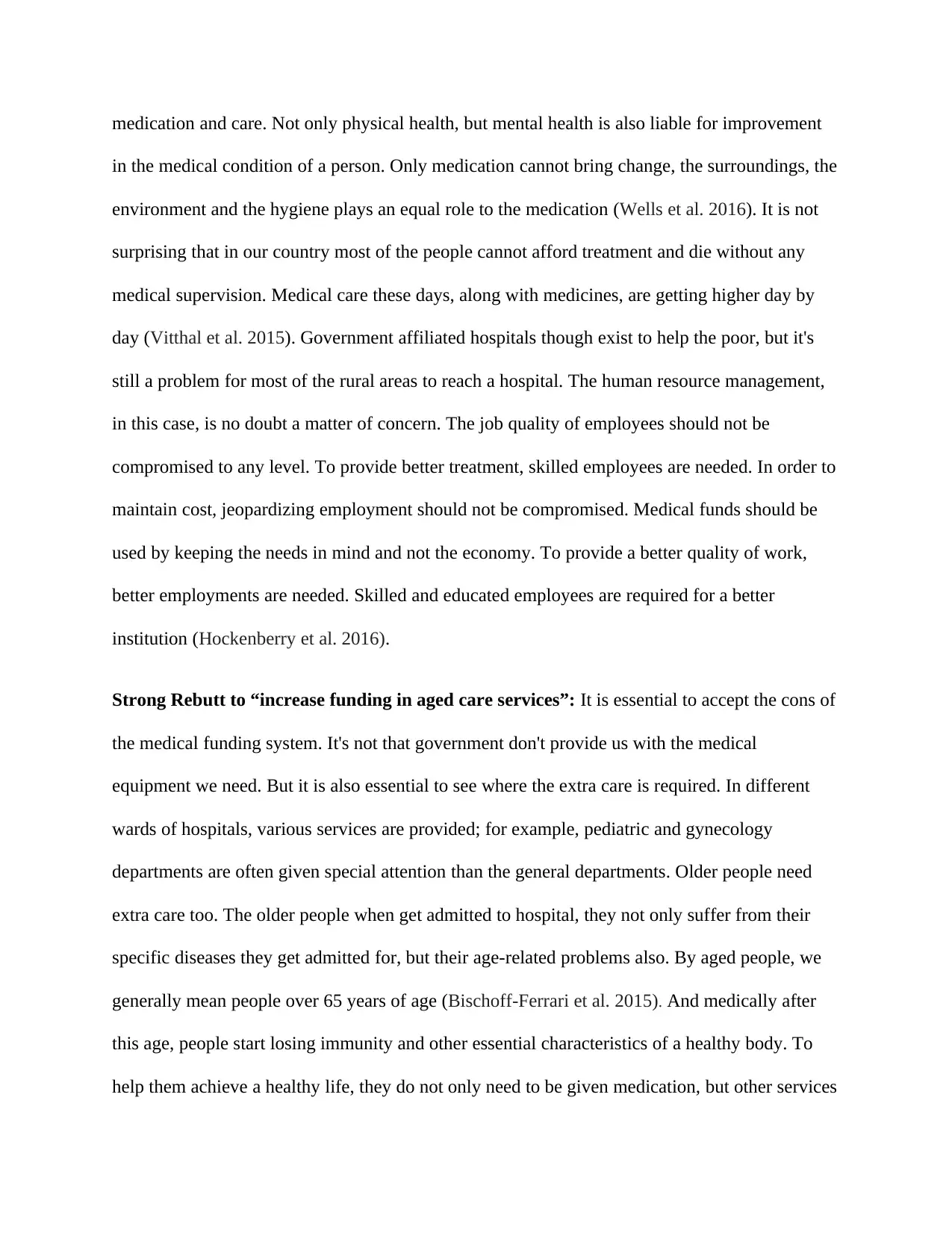
medication and care. Not only physical health, but mental health is also liable for improvement
in the medical condition of a person. Only medication cannot bring change, the surroundings, the
environment and the hygiene plays an equal role to the medication (Wells et al. 2016). It is not
surprising that in our country most of the people cannot afford treatment and die without any
medical supervision. Medical care these days, along with medicines, are getting higher day by
day (Vitthal et al. 2015). Government affiliated hospitals though exist to help the poor, but it's
still a problem for most of the rural areas to reach a hospital. The human resource management,
in this case, is no doubt a matter of concern. The job quality of employees should not be
compromised to any level. To provide better treatment, skilled employees are needed. In order to
maintain cost, jeopardizing employment should not be compromised. Medical funds should be
used by keeping the needs in mind and not the economy. To provide a better quality of work,
better employments are needed. Skilled and educated employees are required for a better
institution (Hockenberry et al. 2016).
Strong Rebutt to “increase funding in aged care services”: It is essential to accept the cons of
the medical funding system. It's not that government don't provide us with the medical
equipment we need. But it is also essential to see where the extra care is required. In different
wards of hospitals, various services are provided; for example, pediatric and gynecology
departments are often given special attention than the general departments. Older people need
extra care too. The older people when get admitted to hospital, they not only suffer from their
specific diseases they get admitted for, but their age-related problems also. By aged people, we
generally mean people over 65 years of age (Bischoff-Ferrari et al. 2015). And medically after
this age, people start losing immunity and other essential characteristics of a healthy body. To
help them achieve a healthy life, they do not only need to be given medication, but other services
in the medical condition of a person. Only medication cannot bring change, the surroundings, the
environment and the hygiene plays an equal role to the medication (Wells et al. 2016). It is not
surprising that in our country most of the people cannot afford treatment and die without any
medical supervision. Medical care these days, along with medicines, are getting higher day by
day (Vitthal et al. 2015). Government affiliated hospitals though exist to help the poor, but it's
still a problem for most of the rural areas to reach a hospital. The human resource management,
in this case, is no doubt a matter of concern. The job quality of employees should not be
compromised to any level. To provide better treatment, skilled employees are needed. In order to
maintain cost, jeopardizing employment should not be compromised. Medical funds should be
used by keeping the needs in mind and not the economy. To provide a better quality of work,
better employments are needed. Skilled and educated employees are required for a better
institution (Hockenberry et al. 2016).
Strong Rebutt to “increase funding in aged care services”: It is essential to accept the cons of
the medical funding system. It's not that government don't provide us with the medical
equipment we need. But it is also essential to see where the extra care is required. In different
wards of hospitals, various services are provided; for example, pediatric and gynecology
departments are often given special attention than the general departments. Older people need
extra care too. The older people when get admitted to hospital, they not only suffer from their
specific diseases they get admitted for, but their age-related problems also. By aged people, we
generally mean people over 65 years of age (Bischoff-Ferrari et al. 2015). And medically after
this age, people start losing immunity and other essential characteristics of a healthy body. To
help them achieve a healthy life, they do not only need to be given medication, but other services
Paraphrase This Document
Need a fresh take? Get an instant paraphrase of this document with our AI Paraphraser
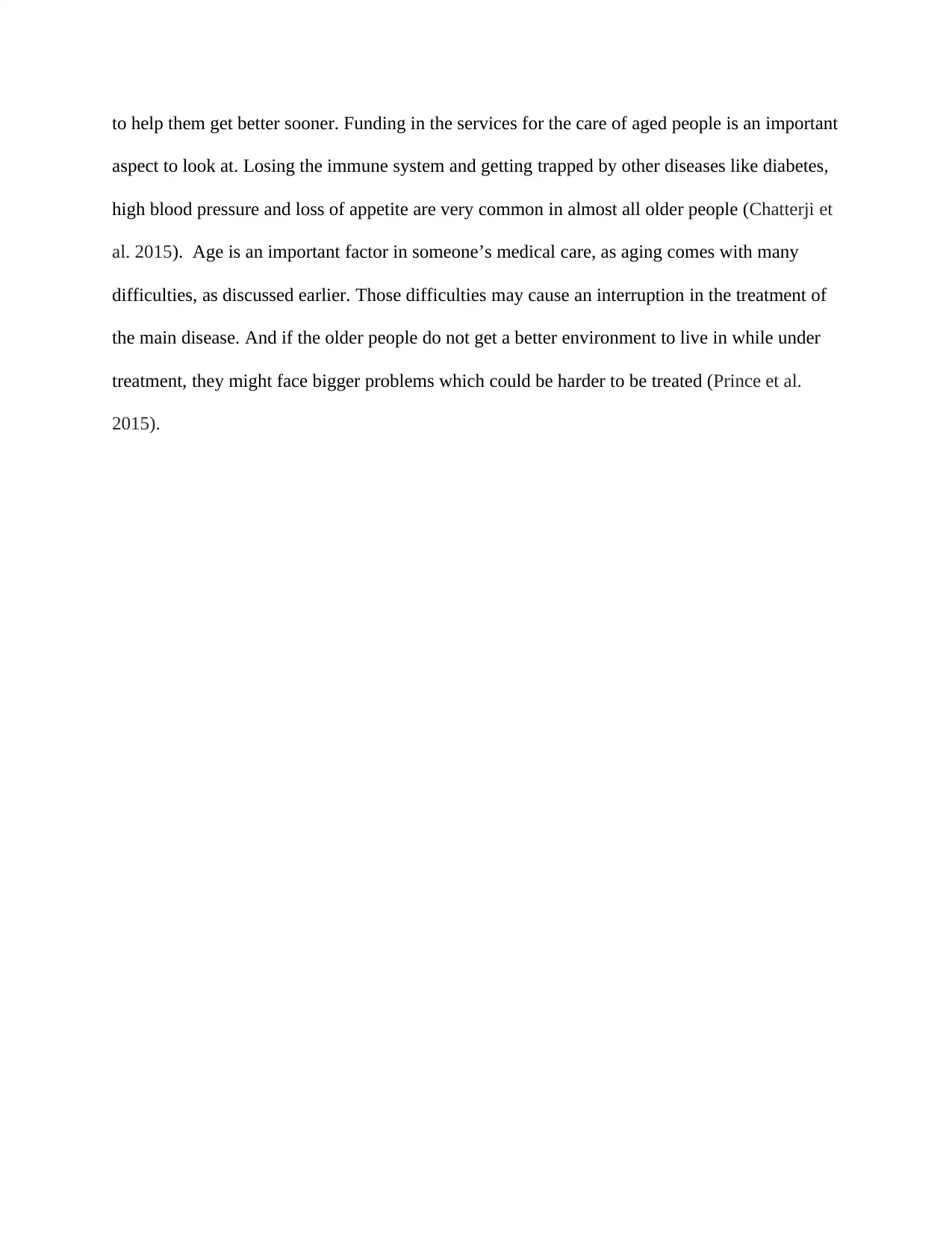
to help them get better sooner. Funding in the services for the care of aged people is an important
aspect to look at. Losing the immune system and getting trapped by other diseases like diabetes,
high blood pressure and loss of appetite are very common in almost all older people (Chatterji et
al. 2015). Age is an important factor in someone’s medical care, as aging comes with many
difficulties, as discussed earlier. Those difficulties may cause an interruption in the treatment of
the main disease. And if the older people do not get a better environment to live in while under
treatment, they might face bigger problems which could be harder to be treated (Prince et al.
2015).
aspect to look at. Losing the immune system and getting trapped by other diseases like diabetes,
high blood pressure and loss of appetite are very common in almost all older people (Chatterji et
al. 2015). Age is an important factor in someone’s medical care, as aging comes with many
difficulties, as discussed earlier. Those difficulties may cause an interruption in the treatment of
the main disease. And if the older people do not get a better environment to live in while under
treatment, they might face bigger problems which could be harder to be treated (Prince et al.
2015).
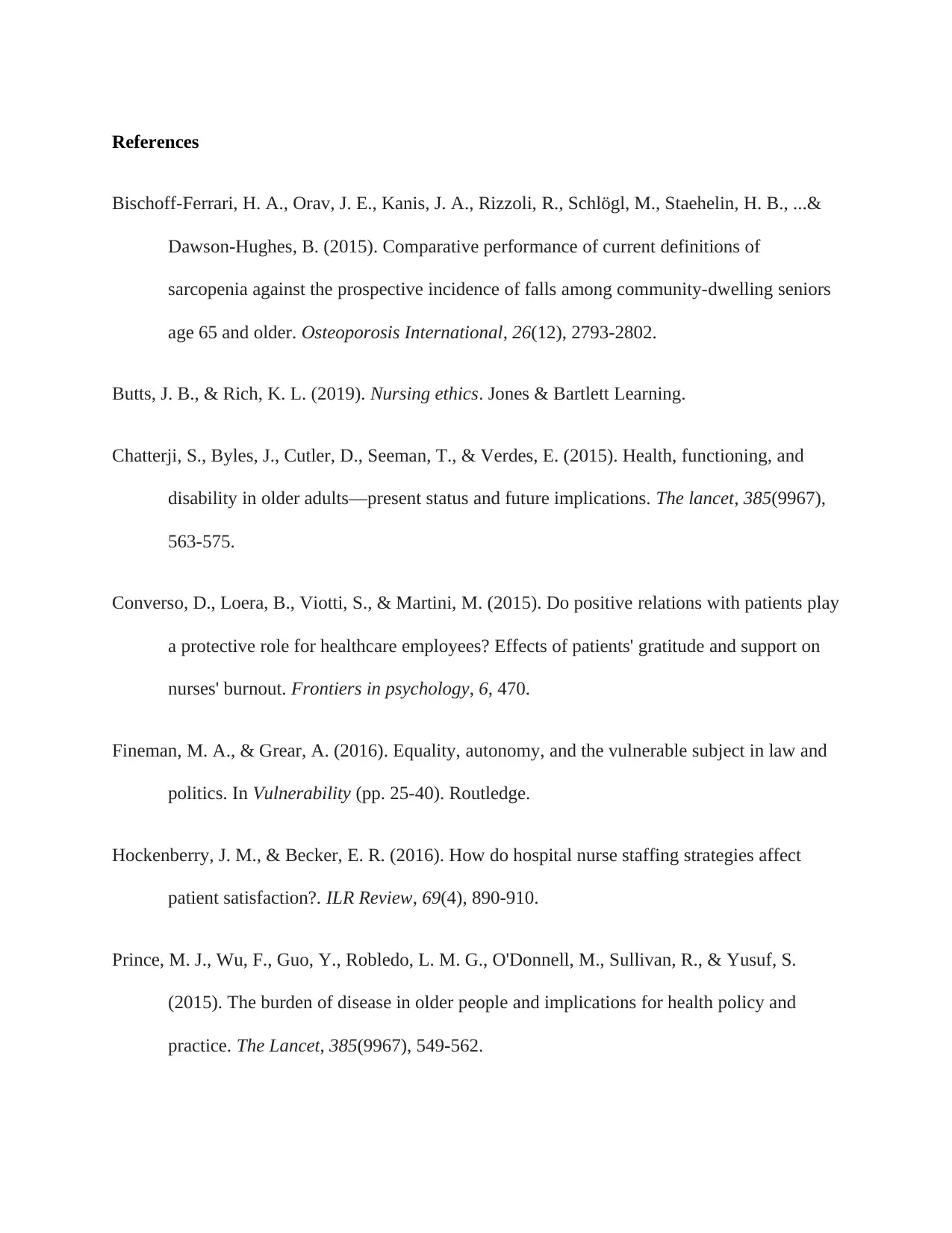
References
Bischoff-Ferrari, H. A., Orav, J. E., Kanis, J. A., Rizzoli, R., Schlögl, M., Staehelin, H. B., ...&
Dawson-Hughes, B. (2015). Comparative performance of current definitions of
sarcopenia against the prospective incidence of falls among community-dwelling seniors
age 65 and older. Osteoporosis International, 26(12), 2793-2802.
Butts, J. B., & Rich, K. L. (2019). Nursing ethics. Jones & Bartlett Learning.
Chatterji, S., Byles, J., Cutler, D., Seeman, T., & Verdes, E. (2015). Health, functioning, and
disability in older adults—present status and future implications. The lancet, 385(9967),
563-575.
Converso, D., Loera, B., Viotti, S., & Martini, M. (2015). Do positive relations with patients play
a protective role for healthcare employees? Effects of patients' gratitude and support on
nurses' burnout. Frontiers in psychology, 6, 470.
Fineman, M. A., & Grear, A. (2016). Equality, autonomy, and the vulnerable subject in law and
politics. In Vulnerability (pp. 25-40). Routledge.
Hockenberry, J. M., & Becker, E. R. (2016). How do hospital nurse staffing strategies affect
patient satisfaction?. ILR Review, 69(4), 890-910.
Prince, M. J., Wu, F., Guo, Y., Robledo, L. M. G., O'Donnell, M., Sullivan, R., & Yusuf, S.
(2015). The burden of disease in older people and implications for health policy and
practice. The Lancet, 385(9967), 549-562.
Bischoff-Ferrari, H. A., Orav, J. E., Kanis, J. A., Rizzoli, R., Schlögl, M., Staehelin, H. B., ...&
Dawson-Hughes, B. (2015). Comparative performance of current definitions of
sarcopenia against the prospective incidence of falls among community-dwelling seniors
age 65 and older. Osteoporosis International, 26(12), 2793-2802.
Butts, J. B., & Rich, K. L. (2019). Nursing ethics. Jones & Bartlett Learning.
Chatterji, S., Byles, J., Cutler, D., Seeman, T., & Verdes, E. (2015). Health, functioning, and
disability in older adults—present status and future implications. The lancet, 385(9967),
563-575.
Converso, D., Loera, B., Viotti, S., & Martini, M. (2015). Do positive relations with patients play
a protective role for healthcare employees? Effects of patients' gratitude and support on
nurses' burnout. Frontiers in psychology, 6, 470.
Fineman, M. A., & Grear, A. (2016). Equality, autonomy, and the vulnerable subject in law and
politics. In Vulnerability (pp. 25-40). Routledge.
Hockenberry, J. M., & Becker, E. R. (2016). How do hospital nurse staffing strategies affect
patient satisfaction?. ILR Review, 69(4), 890-910.
Prince, M. J., Wu, F., Guo, Y., Robledo, L. M. G., O'Donnell, M., Sullivan, R., & Yusuf, S.
(2015). The burden of disease in older people and implications for health policy and
practice. The Lancet, 385(9967), 549-562.
⊘ This is a preview!⊘
Do you want full access?
Subscribe today to unlock all pages.

Trusted by 1+ million students worldwide
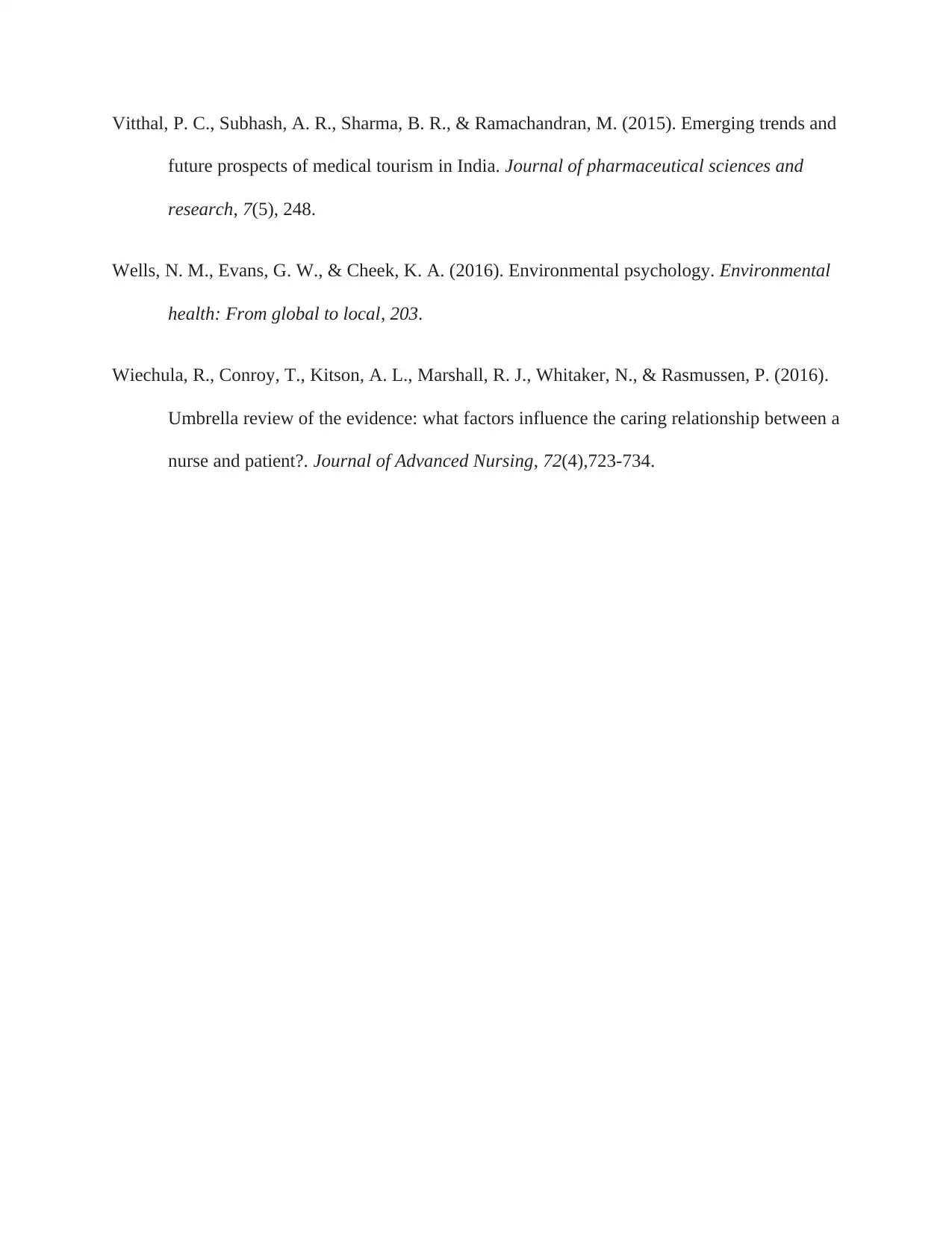
Vitthal, P. C., Subhash, A. R., Sharma, B. R., & Ramachandran, M. (2015). Emerging trends and
future prospects of medical tourism in India. Journal of pharmaceutical sciences and
research, 7(5), 248.
Wells, N. M., Evans, G. W., & Cheek, K. A. (2016). Environmental psychology. Environmental
health: From global to local, 203.
Wiechula, R., Conroy, T., Kitson, A. L., Marshall, R. J., Whitaker, N., & Rasmussen, P. (2016).
Umbrella review of the evidence: what factors influence the caring relationship between a
nurse and patient?. Journal of Advanced Nursing, 72(4),723-734.
future prospects of medical tourism in India. Journal of pharmaceutical sciences and
research, 7(5), 248.
Wells, N. M., Evans, G. W., & Cheek, K. A. (2016). Environmental psychology. Environmental
health: From global to local, 203.
Wiechula, R., Conroy, T., Kitson, A. L., Marshall, R. J., Whitaker, N., & Rasmussen, P. (2016).
Umbrella review of the evidence: what factors influence the caring relationship between a
nurse and patient?. Journal of Advanced Nursing, 72(4),723-734.
1 out of 7
Related Documents
Your All-in-One AI-Powered Toolkit for Academic Success.
+13062052269
info@desklib.com
Available 24*7 on WhatsApp / Email
![[object Object]](/_next/static/media/star-bottom.7253800d.svg)
Unlock your academic potential
Copyright © 2020–2026 A2Z Services. All Rights Reserved. Developed and managed by ZUCOL.





